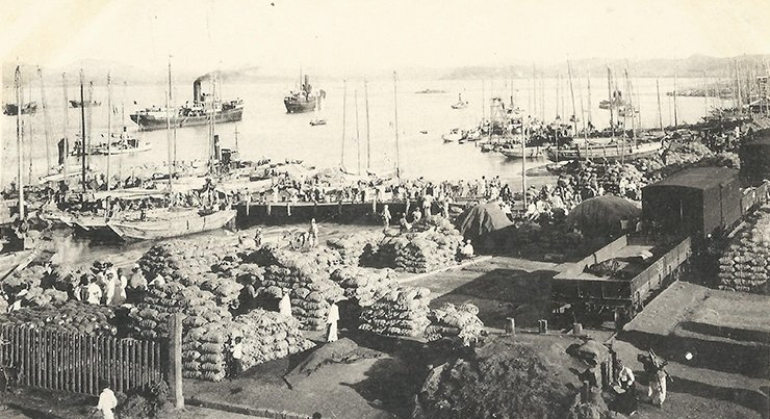
High price of rice in 1897
In the late fall of 1897, the general Korean population was worried about the ever-increasing prices in local markets. Housewives were quite pleased to discover that imported salt was reasonably inexpensive and cabbages and turnips were found in great abundance. The local newspaper noted that this was very welcome news to the thousands of kimchi makers in Seoul.
While most households would be well-supplied with kimchi, many were concerned that there would not be enough rice. Rice, the main staple of production in the country, was also one of its primary exports ― its main customer being Japan. The previous year, Japan had suffered devastating floods and other natural events, causing the country to import twice the amount of rice from Korea than it had in the past.
According to trade reports, most of the rice was purchased by mill owners in Osaka "for the consumption of the workers who [were] fed on the premises." But, because of improved methods of cleaning and hulling rice, many mills were established in Jemulpo [modern Incheon] and Fusan [modern Busan] which competed with the Osaka mills to purchase Korean rice. This resulted in higher prices ― much higher prices.
The quality of Korea rice had also fallen. According to a trade report prepared by British authorities:
"Like most other crops in [Korea], rice seems to be deteriorating in quality, owing to the exhaustion of the seed, and yellow rice of a coarser kind is now not unfrequently found in consignments brought from the interior."
Korea also suffered from Mother Nature's fickleness. Gyeonggi Province suffered from bad weather which led to poor rice crops. In late fall, the Chungcheong Province region suffered horrible storms with strong winds, heavy rain and hail. In one storm, more than 100 houses were knocked down and people were lifted into the air and thrown some distance away. Apparently Mother Nature was not always to blame. The province's governor reported that it was a dragon ascending into the heavens that had caused the great storms plaguing his province. Many people had witnessed this mystical event, though no one actually saw the dragon but they did see its tail.
A newspaper editor in Seoul surmised the dragon sighting was the result of a healthy dose of alcohol.
Regardless of the causes, the price of rice increased steadily in Seoul. The editor of the newspaper noted that the increased prices "may be a fine thing for the producers of the country, but it will be rather tough on the wage earners of the capital." The government needed to act.
According to the British trade report:
"The prospect of a depletion in the home supply, combined with the fear of a scarcity, owing to the indifferent harvest in 1897, alarmed the authorities in [Seoul] who proposed to enforce the stipulations of the treaty, and place an embargo upon the export of the article. Statistics and evidence collected chiefly through the agency of foreigners residing in the rice-growing districts, fortunately convinced the [Seoul] officials that their apprehensions were unfounded, and prevented them from committing a grave economic blunder."
Of course, these foreign experts consulted turned out to be wrong. The "fairly large outflow" of Korean rice and the "unduly heavy demand" caused the prices to soar to record levels causing great hardship upon the common people.
The British trade report from the following year noted: "Some enterprising Chinese, subordinating their respect for the laws of their own country to the chance of doing a good stroke of business, began to import large quantities of rice and millet" from various part of China to supplement Korea's depleted stores. The Chinese importers made a killing, as did the Korean rice exporters; the only losers were the common people.
Sources : www.koreatimes.co.kr





Leave a Comment